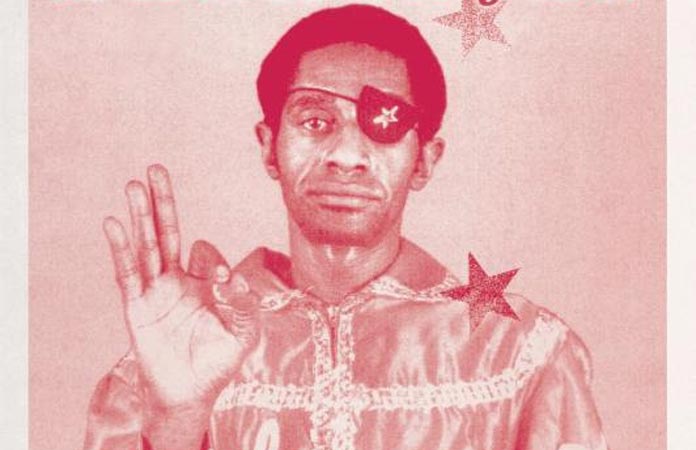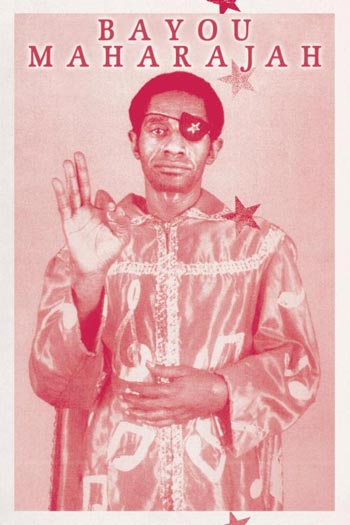Movie Review: Bayou Maharajah
Published on April 25th, 2016 in: Documentaries, DVD, DVD/Blu-Ray Reviews, Movie Reviews, Movies, Music, Reviews |
James Booker collected nicknames like some people collect vinyl. The New Orleans piano great has been called (by himself or by others) The Piano Prince, The Ivory Emperor, the Black Liberace, and the Bayou Maharajah. Filmmaker Lily Keber went with the latter, Bayou Maharajah, as the title of her documentary, now being released on home video.
The veritable Dr. John famously called James Booker “the best black, gay, one-eyed junkie piano genius New Orleans has ever produced.” Bayou Maharajah is a fascinating document of Booker, interspersing rarely seen live footage, home videos, and interviews with those who knew him (including Allen Toussaint, Irma Thomas, Harry Connick, Jr., Dr. John and other stalwarts of the New Orleans music scene).
James Booker’s style is always recognizable, from his inspired covers to his own compositions. Student Harry Connick, Jr. explains and breaks down Booker’s Chopinesque sound in an enlightening moment of the film, and it is fascinating. Booker was a virtuoso. The live footage is a revelation, showing his incredibly elegant, yet raw, playing.
Booker’s sense of style, though, was killer. He cut a striking figure with his starred eye patch and flamboyant sense of dress. Nearly everyone interviewed for Bayou Maharajah has a different version of how Booker ended up with that eye patch. He told multiple stories about it, wildly fanciful but sometimes believable, including that Ringo Starr was the remover of said eye during a fight. There’s footage of James Booker and Dr. John performing on Don Kirshner’s Rock Concert and it is possibly the coolest thing ever committed to film. No one has looked cooler.
After having a regional hit at age 14 with “Doin’ The Hambone,” James Booker played with everyone in the 1960s. But he would spiral after the death of his sister, then his mother, which led to his heroin abuse. He ended up in Angola. Later, he spirals again when he’s in L.A. to record. It’s a fascinating bit of psychology—he’s been going through the methadone program and finishes. He had been on a placebo version for weeks, but once he no longer has the ritual of getting the methadone, it’s all over for him and he goes back to heroin.
The people in Europe, always receptive and way ahead of the curve on good music, love James Booker. He gets great recognition for his gifts (though he does tend to ramble between songs). The footage of these live shows is brilliant and incredibly moving.
Bayou Maharajah doesn’t gloss over what a prickly character James Booker could be. He didn’t want to play the game of doing the bidding of a record company, and selling records without record company PR behind an artist is virtually impossible. There are hilarious, heart-breaking stories told about him, the kind of stories one tells about a legend and about a mess. The making of Classified results in funny, unsurprising anecdotes.
James Booker died in his early 40s. He had various health issues, mental and physical, but that makes it no less tragic. Dr. John’s sadness is palpable in the film when discussing Booker’s death. The ending moments, with Booker’s stunning version of “People Get Ready” over his funeral footage, are indelible.
There’s much to love about Bayou Maharajah. There’s glorious footage of the French Quarter when it was a flamboyant secret to people outside of New Orleans. There’s so much interesting footage that the only quibble comes in Keber’s need to use it all. There are a couple of moody black and white montages that are accompanied by Booker’s music that cause the narrative to drag a bit. But it’s a glass-half-full thing: the music is incredible, and that’s the point of a music documentary.
Bayou Maharajah is out on DVD on April 26 from Virgil Films.

Time limit is exhausted. Please reload the CAPTCHA.